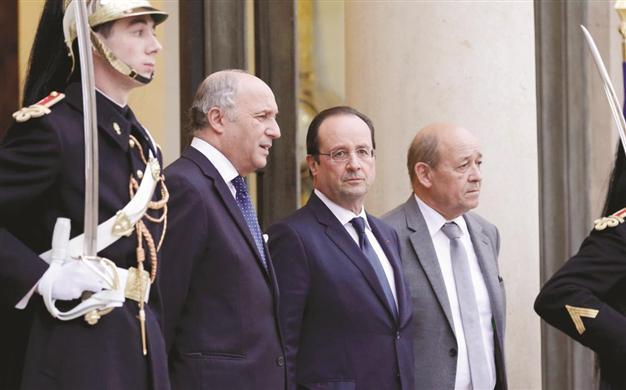France seeks to put Turkish ties back on track
ISTANBUL - Hürriyet Daily News

REUTERS photo
French President François Hollande is set to embark on a landmark visit to Turkey, becoming the first Gallic head of state to make a formal trip to the country in 22 years for a visit designed to repair the nations’ frayed ties.
Paris appears set on putting relations back on track and tapping Turkey’s economic potential, as the visit will feature the signing of a number of agreements on cooperation in various fields.
The visit comes after difficult years in bilateral ties under the presidency of Hollande’s predecessor, Nicolas Sarkozy, whose strong views against Turkey’s bid for European Union membership strained relations between the two capitals.
Although Turkey excluded French companies from giant projects whenever possible, economic relations were not seriously affected, as France remained one of the biggest investors in Turkey. But France – currently the sixth biggest investor in Turkey – would like to make full use of the economic potential it sees in Turkey.
France’s interests include energy, infrastructure and transportation, with a special focus on air travel and railways. Turkish Airlines is one of the important most important clients for Airbus, while a Japanese-French alliance led by Mitsubishi Heavy Industries and France’s Areva will build Turkey’s second nuclear power plant. The growth of the Turkish middle class also appears to have raised the appetite of the French business community, as there is increasing interest in the agriculture and health sectors.
In order to improve the political climate with Ankara to clear the way for increased economic cooperation, Hollande will try to dispel the image that France is blocking Turkey’s EU accession.
Paris believes that the approach endorsed by Sarkozy, who blocked entry talks on five chapters, has not proved effective and that maintaining a dialogue between Turkey and the EU will ensure that the union can continue to encourage a continuation of reforms.
Despite the optimism, there are question marks among opinion makers in Paris about the timing of the visit, as the Turkish government is under criticism for what is perceived as undemocratic steps to cover up corruption charges.
Ultimately, the talks seem likely to continue on from Prime Minister Recep Tayyip Erdoğan’s discussions in Brussels this past week, with Hollande expected to again urge respect for the rule of law and the democratic separation of powers.
Hollande is expected to endorse German Chancellor Angela Merkel’s maxim to remain loyal to prior commitments to the EU. As elections for the European Parliament approach, the Élysée Palace has given the message to Turkey skeptics in France that the process will be very long and open-ended and that the decision will ultimately be made by the citizens of Turkey and Europe – an indication that there will be referenda prior to Turkey’s entry.
While France has already made a gesture by lifting its veto on one of the accession chapters last November, it remains unclear whether Hollande’s messages will convince Ankara, since Paris has put the ball in the EU’s court in terms of the remaining chapters.
Sarkozy had blocked talks on economic and monetary policy, agriculture and rural development, regional policy and coordination of structural instruments, institutions and financial and budgetary provisions. France lifted its veto talks on the regional policy chapter last year, while the blockage on agriculture and rural development stems not only from France but also from a European Commission decision made in reaction to Turkey’s refusal to allow Greek Cypriot ships to use its ports.
Developments in Syria, Iran, Afghanistan and Cyprus will be the main items on the agenda as Hollande will hold separate talks with President Abdullah Gül and Erdoğan. Hollande will also meet Kemal Kılıçdaroğlu, the head of the main opposition party Republican People’s Party (CHP).
The Armenian question will also be raised during the talks ahead of the Armenian community’s efforts to commemorate the centenary of what they and many others around the world term a genocide, the World War I-era mass killings of Armenians in the Ottoman Empire.
Hollande and his ministers could also raise the case of Pınar Selek, a 41-year-old academic who, despite being cleared three times of complicity in a 1998 explosion in Istanbul, was sentenced to life imprisonment by a Turkish court in January 2013. Representatives of French civil society have called on Hollande to raise the subject during his visit. Selek is currently living in exile in France.
After holding talks in Ankara, Hollande will go to Istanbul to deliver a speech at Galatasaray University. Accompanied by French business leaders, he will participate together with Gül in an economic forum during which he will also meet members of the Turkish business community, as Paris is interested in seeing more Turkish investment in France.
Seven ministers will be accompanying Hollande, including Foreign Minister Laurent Fabius; External Commerce Minister Nicole Bricq; Industry Minister Arnaud Montebourg; Ecology, Sustainable Development and Energy Minister Phillipe Martin; Defense Minister Jean-Yves Le Drian; Higher Education Minister Geneviève Fioraso and Agriculture and Forestry Minister Stéphane le Foll.
